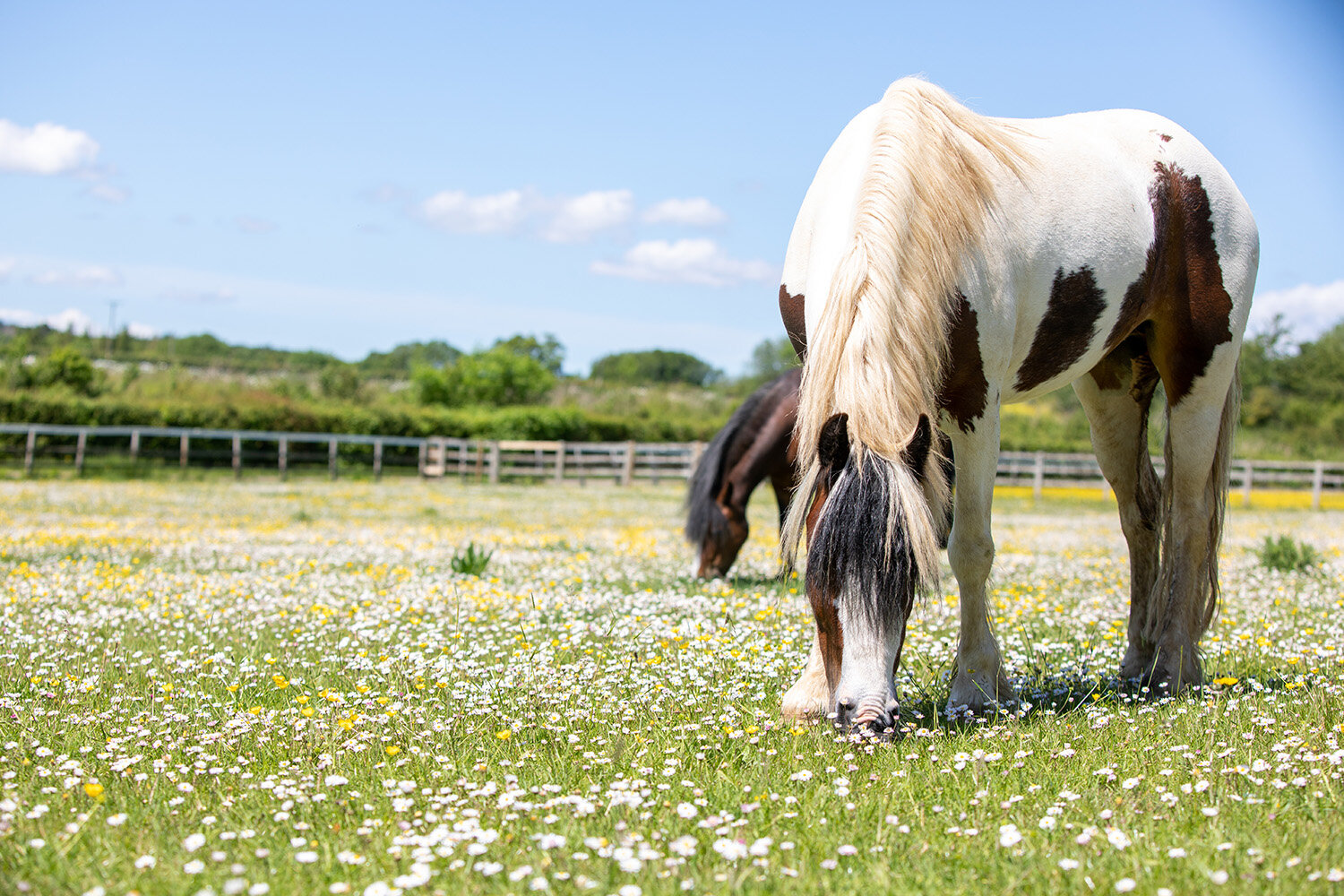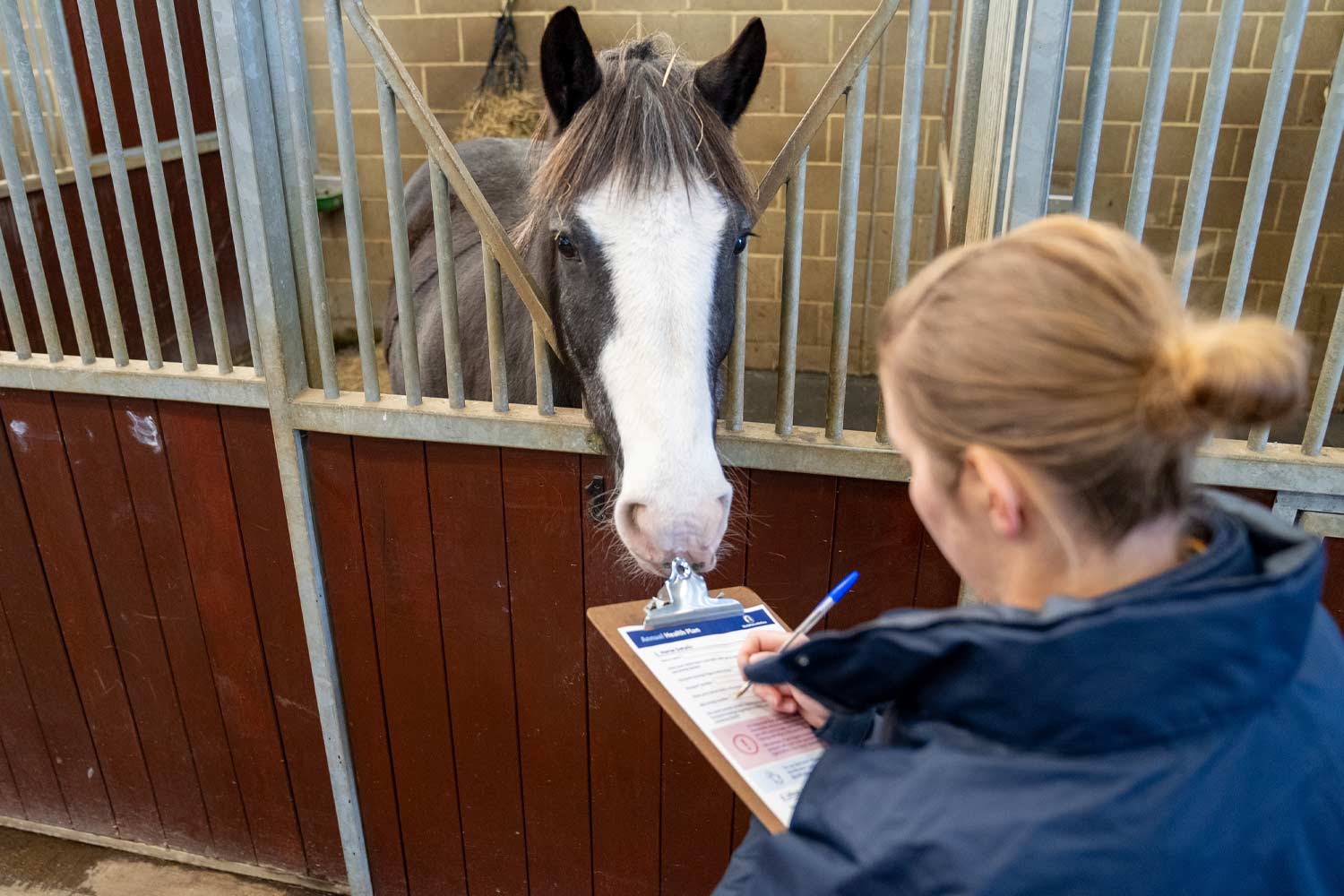When considering what is best for your horse, you must consider why they need food, their species-specific needs, their individual needs and what the basic rules of feeding are.
All animals require food to maintain health and welfare, provide materials for growth, repair damaged tissues and provide energy for essential metabolic processes and exercise.
The horse is predominantly a grazing animal, designed to eat small amounts, frequently. Their natural feed is grasses and other edible shrubs and plants. They have evolved to eat forage-based diets for approximately 16-18 hours a day.
Rules of feeding horses
This imitates the horse’s natural feeding pattern of chewing frequently ensuring saliva is produced and maintains a constant passage of food through the digestive system. It also ensures that the horse’s stomach is not overloaded.
This maintains hind gut health because it provides the horse with fibre from the plant cell walls, which the friendly gut bacteria need to stay healthy. Ensuring your horse has suitable access to forage can help prevent colic and gastric ulcers. It is important that foraging opportunities are integrated into your horse’s routine, as restricting forage can lead to behavioural and health issues.
More work requires more calories (energy), which is why horses in hard work normally need additional calories from concentrates. Too much or too few calories will result in the animal being over or under weight. As your horses workload increases start by replacing low calorie forages with higher calorie forages and then replace some of the forage with concentrate feeds If needed. Most horses should eat between 2-2.5% of their bodyweight daily, for horses needing to lose weight, this may reduce to 1.5% of bodyweight.
By fat scoring regularly you will be able to tell whether your horse needs to gain, lose or maintain its fat cover. You should also weigh your horse so you can work out how much you should be feeding your horse. It is also worth remembering that an overweight horse which is lacking energy is unlikely to benefit from a higher calorie feed. For more information and to learn how to assess your horse’s fat score and to use a weigh tape see our Right Weight page. Remember: ‘feed’ includes forage (grass, hay and haylage) as well as concentrate feed.
Bacteria in the large intestine break down the feed and they have to adapt to any changes in the diet. Sudden changes can cause some bacteria to die, produce poisons and cause metabolic disorders.
Horses are creatures of habit and thrive on a regular routine. If your horse is fed by your yard, then they are normally fed in a routine. If you are on DIY livery, you may want to create a feeding rota with other liveries or make sure there is someone who can feed your horse if you can’t make it to the yard.
Feed should ideally be kept in vermin proof feed bins, and if stored in the bag should be raised of the floor using pallets to prevent spoiling. Feed buckets should be rinsed out after each use, and thoroughly cleaned as often as possible. Any utensil used to mix feed should be cleaned regularly. To prevent cross contamination of medication (e.g. bute or antibiotics in feed) or spread of diseases, each horse should have their own feed bowl(s) and any feeds containing drugs should have their own mixing utensil. All feeds should be checked for hygienic quality; mouldy feed or forage should not be fed.
Grass contains up to 90% water. However, if you are restricting grass or feeding conserved forages, then succulents like apples and carrots help to maintain the horse’s interest and adds moisture to the feed. Soaked sugar beet can also be used as a succulent, is high in fibre and has incredible water holding capacity.
A full stomach will put pressure on the lungs and affect the horse’s breathing as well as pushing acid content from the lower stomach into the unprotected upper stomach causing damage. Fast work results in redistribution of the blood in the body, leading to impaired digestion.
Lack of water is dangerous for horses. All horses should have access to clean, fresh water either in buckets, troughs or automatic drinkers. Grass is 90% water, horses on restricted grazing or conserved forage may need their water intake monitored more closely.
Finally:
Remember that many leisure horses may only need the addition of a vitamin and mineral supplement or balancer rather than a concentrate feed to balance their diet of forage
All reputable feed manufacturers that have UFAS certification produce balanced mixed feeds suitable for animals of varying ages and states of health and for different types of work or exercise being undertaken.
For advice on the most suitable feed for your horse or pony, you can either consult your vet, one of the helplines provided by the feed manufacturers or an independent nutritionist. If you would like to contact an independent nutritionist, you can search the Equine Nutritionist and Feed Advisor Register (ENFAR) or the Association for Nutrition voluntary register.

As our official suppliers, Baileys Horse Feeds generously donate feed for the horses and ponies being cared for at our four Rescue and Rehoming Centres, which is invaluable in helping underweight horses in poor condition to carefully gain weight. The low-calorie balancer also enables us to make sure good doers still get all the vitamins and minerals they need whilst on a restricted diet. Thank you, Baileys!
Popular advice in Nutrition

Weight: is your horse the right weight?
Do you know if your horse is a healthy weight? Are you struggling with a good doer? Learn how to assess your horse’s condition and find practical tips for weight management.

Horse Nutribaloney
Common horse nutrition myths dispelled by Registered Independent Equine Nutritionist Clare MacLeod MSc RNutr.
Other advice categories
All webinar categories:
Call our Advice Line
+44 (0)1953 497 238Not found the advice or answer you were looking for here? Then our Advice Line is available during office hours, or you can email us on education@worldhorsewelfare.org to let us know what topics you were looking for.


